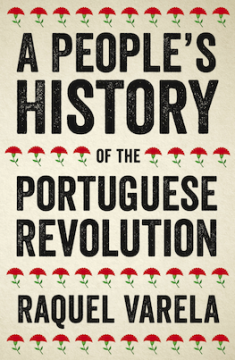
Additional Information
Book Details
Abstract
On the 25th April 1974, a coup destroyed the ranks of Portugal’s fascist Estado Novo government as the Portuguese people flooded the streets of Lisbon, placing red carnations in the barrels of guns and demanding a ‘land for those who work in it’.
This became the Carnation Revolution - an international coalition of working class and social movements, which also incited struggles for independence in Portugal’s African colonies, the rebellion of the young military captains in the national armed forces and the uprising of Portugal’s long-oppressed working classes. It was through the organising power of these diverse movements that a popular-front government was instituted and Portugal withdrew from its overseas colonies.
Cutting against the grain of mainstream accounts, Raquel Cardeira Varela explores the role of trade unions, artists and women in the revolution, providing a rich account of the challenges faced and the victories gained through revolutionary means.
'Lively, brilliantly documented and filled with the voices of Portugal's ordinary people, this book recovers the revolution from below that shook Portugal in 1974-5'
Colin Barker, author of 'Festival of the Oppressed: solidarity, reform and revolution in Poland, 1980-81'
'An excellent, well-written, and radical introduction to a complex and immensely important history.'
Marcel van der Linden, International Institute of Social History
Table of Contents
| Section Title | Page | Action | Price |
|---|---|---|---|
| Cover | Cover | ||
| Contents | vii | ||
| Photographs, Figures and Tables | ix | ||
| Acknowledgements | xi | ||
| Editor's Note on the English Edition | xii | ||
| List of Abbreviations | xiii | ||
| 1. Introduction | 1 | ||
| 2. The Seeds of Change | 6 | ||
| 3. 25 April 1974: 'The People are no Longer Afraid' | 16 | ||
| 4. Who Governs? | 32 | ||
| 5. The Anti-Colonial Movements and the Myth of a 'Bloodless Revolution' | 52 | ||
| 6. Strikes and their Reverberations | 67 | ||
| 7. Self-Management and the Struggles Against Redundancies | 83 | ||
| 8. Women in a Democracy are Not Mere Decoration: Social Reproduction and Private Life in the Revolution | 98 | ||
| 9. Artists and the Revolution | 109 | ||
| 10. Workers' Commissions and Unions | 119 | ||
| 11. 'Here is the Nursery' - Urban Struggles and Residents' Commissions | 128 | ||
| 12. Workers' Control, 11 March and Nationalisations | 139 | ||
| 13. The Birth of the Welfare State | 155 | ||
| 14. Scheming for Power | 167 | ||
| 15. The Land for its Workers: Agrarian Reform | 183 | ||
| 16. The 'Hot Summer' of 1975 and the Fifth Government's Frail Governance | 194 | ||
| 17. Spain and Other 'Links in the Chain' | 212 | ||
| 18. The Crisis | 225 | ||
| 19. Democracy and Revolution: The Meaning of the Carnation Revolution | 249 | ||
| 20. In Celebration | 266 | ||
| Chronology | 271 | ||
| Notes | 285 | ||
| Bibliography | 315 | ||
| Index | 324 | ||
| About the Author | 334 |
